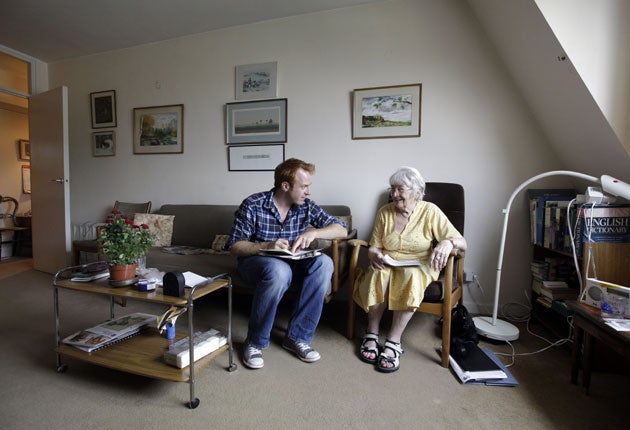Cuts will cost charities £3bn over five years
Voluntary organisation calls for ‘informed debate’ on the future of services

Britain's voluntary organisations face losing almost £3bn in funding over the next five years, according to the first comprehensive report to analyse the coming impact of spending cuts on the public sector.
In a blow to David Cameron's much-trumpeted "Big Society", charities across the UK face the prospect of their funds dropping by £911m a year by 2016, and losing £2.8bn in total over the next five years, according to research by the National Council for Voluntary Organisations (NCVO) published today.
The six-month study, which looked at how cuts to central and local government over the next half decade will hit the voluntary sector, predicts that charities will lose 7.7 per cent of their current public funds by 2016 if government departments pass on their cuts proportionately. Currently, central and local government together contribute at least £11.8bn to charities each year.
Karl Wilding, NCVO's head of policy and research, said he was not trying "just to shock with these numbers", but instead wanted to generate an "informed debate about the cuts and their impact" with what he calls "realistic and conservative estimates". He added that the voluntary sector could lose much more, if local councils cut their charitable contributions at a higher rate than cuts to their overall spending.
No council will face more than an 8.8 per cent reduction in its revenue this year, but NCVO's report said half of all local authorities are cutting their voluntary sector grants disproportionately, by an average of almost 11 per cent. Nottingham County Council is cutting its charitable budget by £1.8m next year – a cut of 56 per cent.
Tony Travers, director of the Greater London Group at the LSE, said: "The whole issue points to a problem for the Government. They are simultaneously trying to reduce local government spending, because they want to cut the deficit ... but, on the other hand, they also want to extend the use of charitable providers, to take on a greater part of what the state ought to deliver."
The report follows research from the union-backed website False Economy, which used hundreds of Freedom of Information requests to show that 2,000 charities in England have seen funding cuts this year. Ralph Michell, head of policy at the Association of Chief Executives of Voluntary Organisations, which represents 2,000 British charity leaders, said this report was just the "tip of the iceberg".
He added: "There are types of charities that are more dependent on government money than others, and they will find it very difficult, particularly with the speed of these cuts, to replace lost income from other sources."
Sheffield Alcohol Support Service, which has operated for 33 years, knows only too well how government cuts can render it almost impossible to function. Experiencing a 50 per cent reduction, £500,000, in its government funding last year and losing 15 of its 37 staff, the centre almost had to close down before it decided to charge for some of its services.
Mark Boast, 51, came to the centre's support groups two years ago. He said: "I doubt I could have stayed dry without it. I am concerned in general: every day a new addiction appears. Without support groups and funding to back them up, problems of addiction are only going to get worse."
A spokesman from the Department for Communities and Local Government said the funding that councils received this year was "fair". He said they were being "short-sighted" if they failed to "recognise the importance of the [voluntary] sector".
But, according to the NCVO, central government will also have to make considerable cuts to voluntary spending over the spending review period. The Department for Culture, Media and Sport was predicted to cut the most (£104m), followed by the Home Office (£91m) and the Department for Business, Innovation and Skills (£73m).
Cathy Pharoah, a professor of charity funding at London's Cass Business School, said the public funding cuts will be "very difficult for the voluntary sector to overcome".
Angela Geer
Executive director for older people's services, Women's Royal Voluntary Service
With around 2,600 staff, 45,000 volunteers and operating 1,500 different services in 10 regions throughout the country, the Women's Royal Voluntary Service (WRVS) is one of the UK's largest charities.
It was founded more than 70 years ago. Focusing on providing support for the elderly, the WRVS suffered a knock this year when local authorities removed all subsidies for its £3.6m "meals on wheels" programme and cut grants for many of its community projects.
Angela Geer, the charity's executive director for older people's services, said it was large enough to avoid having to make redundancies, but it was having to make "substantial cutbacks".
"We know for every pound the local authority gives us, they get £2 of investment – our services keep people out of residential care and hospitals. If the elderly are given less support, there will be a negative effect on the state, requiring more substantial services later, costing more money and adding to a vicious cycle.
"The Government can't just make cuts and expect things not to change. If our grants and subsidies are drying up, it does affect our ability to reach these older people and, ultimately, this growing population will suffer."
Join our commenting forum
Join thought-provoking conversations, follow other Independent readers and see their replies
Comments
Bookmark popover
Removed from bookmarks